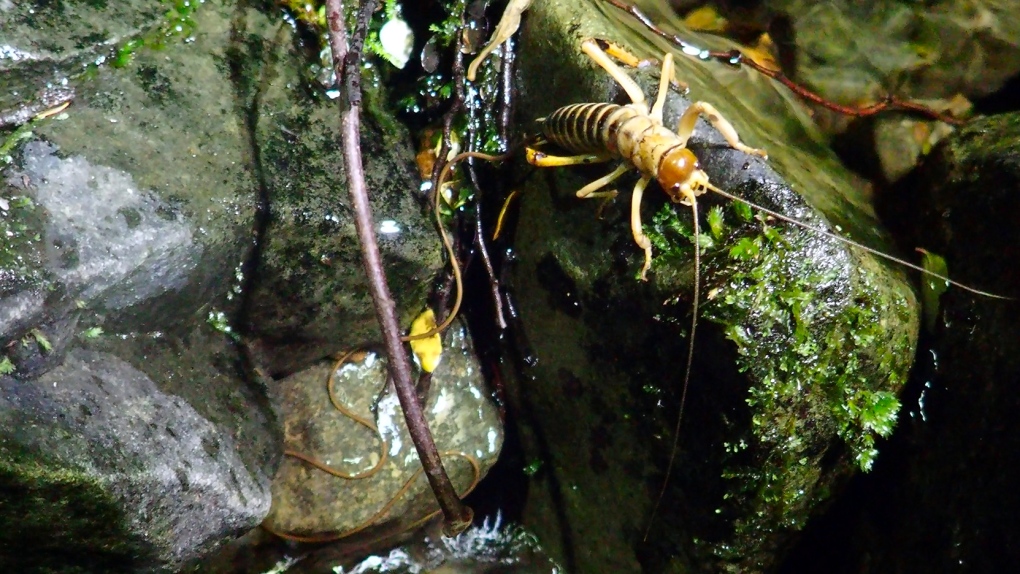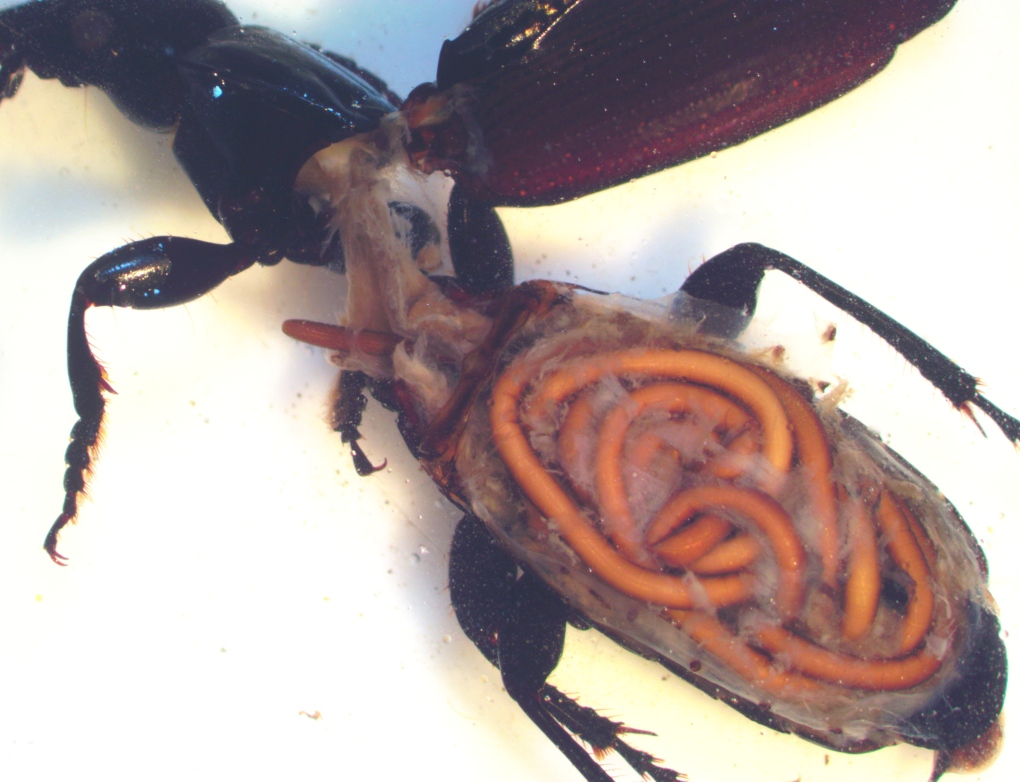Meet the B.C. scientist trying to solve the mystery of mind-controlling parasitic worms
 A hairworm egresses from a tree wētā in New Zealand in this 2019 photo. (Image credit: Jeff Doherty)
A hairworm egresses from a tree wētā in New Zealand in this 2019 photo. (Image credit: Jeff Doherty)
A researcher at the University of British Columbia is working to figure out exactly how a type of parasite causes its insect hosts to enter bodies of water, where they usually drown.
Post-doctoral fellow in general parasitology and ecology Dr. Jeff Doherty studies hairworms—creatures seemingly straight out of a horror movie.
These parasites have a complex lifestyle, he explained to CTV News. A hairworm begins its life in the water, where it will infect its first host, an aquatic insect, as a larva. Then that host—with the hairworm inside—will be eaten by a different land insect, Doherty continued.
The hairworm then grows inside its second host, such as a cricket, a cockroach or a ground beetle. The worms can reach up to 20 to 30 times the length of the insect they infect, Doherty said.
“They have to grow inside the body cavity of that land insect. So they burrow or they bust through the gut of that host to then grow inside by absorbing the nutrients or the blood of that insect,” he added.
When it comes time for the worm leave its host, mate and lay eggs, it must return to the water. “And that's when we notice remarkable changes in the behaviour of that insect host,” said Doherty.
The hairworm somehow takes control of the insect to make it enter the water and die. And exactly how that “mind control” works is the mystery scientists like Doherty are trying to solve.
 A mature hairworm inside its host, a ground beetle, sampled from a pitfall trap in New Zealand in 2011. (Image credit: Jeff Doherty) “What's at the forefront of current research is understanding what these parasites are doing to change that behavior, because crickets will not naturally enter water. So those parasites are definitely doing something to trigger that behaviour,” he said.
A mature hairworm inside its host, a ground beetle, sampled from a pitfall trap in New Zealand in 2011. (Image credit: Jeff Doherty) “What's at the forefront of current research is understanding what these parasites are doing to change that behavior, because crickets will not naturally enter water. So those parasites are definitely doing something to trigger that behaviour,” he said.
“Just the mere fact that it's such strong changes in the behaviour of the host is really cool. And I wanted to figure out what is going on.”
In the lab, Doherty infects crickets with hairworms and records the animals’ behaviours throughout the infection period, including how they react to different stimuli. He also freezes them at different stages to get a closer look at their tissues and brains, checking for changes in gene or protein expression.
He added a paper from a research group in Japan published last week provides some hints as to what molecules the hairworms are secreting into their hosts—ones that might act as neurotransmitters and increase attraction to certain environmental signals, guiding the insects into the water.
Doherty emphasized that there are a lot is still unknown about what the hairworm specifically does to compel a cricket to drown itself.
“That remains an open question,” he said. “We may still be far away but we’re trying to build those steps up to really finding those mechanisms the hairworm is using.”
Doherty said there are around 350 species of hairworm, and they can be found all around the globe—including in B.C.—but there have been only a few reports of the worms in our province.
And no, hairworms cannot infect humans. The only way a person could ingest a hairworm is by eating an infected insect, and if that happens, the worm would not survive inside the human body.
“There is absolutely no risk of infecting humans; these are very specific to insects,” Doherty reassured. “We have nothing to worry about.”
CTVNews.ca Top Stories

'Mayday! Mayday! Mayday!': Details emerge in Boeing 737 incident at Montreal airport
New details suggest that there were communication issues between the pilots of a charter flight and the control tower at Montreal's Mirabel airport when a Boeing 737 made an emergency landing on Wednesday.
Trudeau appears unwilling to expand proposed rebate, despite pressure to include seniors
Prime Minister Justin Trudeau does not appear willing to budge on his plan to send a $250 rebate to 'hardworking Canadians,' despite pressure from the opposition to give the money to seniors and people who are not able to work.
Hit man offered $100,000 to kill Montreal crime reporter covering his trial
Political leaders and press freedom groups on Friday were left shell-shocked after Montreal news outlet La Presse revealed that a hit man had offered $100,000 to have one of its crime reporters assassinated.
Cucumbers sold in Ontario, other provinces recalled over possible salmonella contamination
A U.S. company is recalling cucumbers sold in Ontario and other Canadian provinces due to possible salmonella contamination.
Trudeau says no question incoming U.S. president Trump is serious on tariff threat
Prime Minister Justin Trudeau says incoming U.S. president Donald Trump's threats on tariffs should be taken seriously.
In a shock offensive, insurgents breach Syria's largest city for the first time since 2016
Insurgents breached Syria's largest city Friday and clashed with government forces for the first time since 2016, according to a war monitor and fighters, in a surprise attack that sent residents fleeing and added fresh uncertainty to a region reeling from multiple wars.
Canada Bread owner sues Maple Leaf over alleged bread price-fixing
Canada Bread owner Grupo Bimbo is suing Maple Leaf Foods for more than $2 billion, saying it lied about the company's involvement in an alleged bread price-fixing conspiracy.
John Herdman resigns as head coach of Toronto FC
John Herdman, embroiled in the drone-spying scandal that has dogged Canada Soccer, has resigned as coach of Toronto FC.
Musk joins Trump and family for Thanksgiving at Mar-a-Lago
Elon Musk had a seat at the family table for Thanksgiving dinner at Mar-a-Lago, joining President-elect Donald Trump, Melania Trump and their 18-year-old son.
































